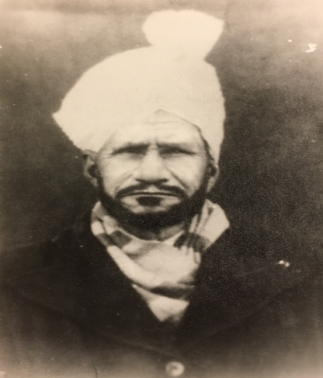
Early life
Maulwi Muhammad Munshi Khan Sahib (may Allah have mercy on him) was born in 1884 in a village called Derianwala, next to Sialkot.1 Growing up, there was an Imam in his village named Nizam-ud-Din who one day acquired some Ahmadi literature. These books were enough to make Nizam-ud-Din Sahib accept Ahmadiyyat at heart, but he had not expressed his belief openly. Rather, he requested the Ahmadiyya Muslim Jamaat’s headquarters in Qadian to send some missionaries to do tabligh in his village.2
Thus, in 1918, Hazrat Hafiz Roshan Ali Sahib (may Allah be pleased with him) and Hazrat Maulwi Allah Ditta Sahib of Khana Mianwali, Narowal were sent to Munshi Sahib’s village. Munshi Sahib had heard from somewhere about the prophecy of the eclipse. He asked the missionaries about this and they showed him the Civil and Military Gazette (newspapers) that had recorded the eclipse, thus proving that the prophecy was indeed fulfilled. Munshi Sahib also asked about ‘dajjal’; the missionaries explained that according to the Promised Messiah (peace be upon him), ‘dajjal’ refers to the Western nations and their innovations like the train, airplane, and ship. After hearing all of this, Munshi Sahib was ready for bai’at.3 He, along with some of his other relatives, accepted Ahmadiyyat. In total, 127 people accepted Ahmadiyyat in Derianwala.4
Hazrat Khalifatul-Masih II, Musleh-e-Mau’ud, Mirza Bashir-ud-Deen Mahmood Ahmad (may Allah be pleased with him), then sent Hazrat Hafiz Roshan Ali Sahib (may Allah be pleased with him) and Hazrat Maulawi Ibrahim Sahib Bakapuri (may Allah be pleased with him) to teach the new Ahmadis about their faith.5
These missionaries motivated the people of Derianwala to go to Jalsa Salana Qadian. Thus, in 1918, 80 people from Derianwala (including Munshi Sahib) walked to Qadian on foot. This journey was approximately 19 hours. Along the way, Munshi Sahib would be asked where this giant group was heading, which opened many tabligh opportunities for him.
The Punjabi Poet
In 1939, Hazrat Chaudhry Fateh Muhammad Sial Sahib (may Allah be pleased with him) admitted Munshi Sahib into the Muallimeen course. After some training, he was immediately sent out for tabligh.6
Munshi Sahib had a very powerful voice. He was a Punjabi poet who wrote much on the Promised Messiah (peace be upon him) and his Khulafa, and his pen name was بلے بلے (Ballay Ballay). He would go from town to town, giving speeches during the day and reciting poetry at night. During the day, he would travel from mosque to mosque and while at night, he would find the highest rooftop and recite his poetry loud enough for all to hear. This was his special way of doing tabligh, which was highly effective as people in this time would sleep on rooftops.7
Some of his poetry is as follows:
بلے بلے قرآن وچوں نبی کڈ دے
Ballay Ballay, bring (some mention of) the prophets from the Quran
بلے بلے سپارہ اٹھواں تو کھول کے
Ballay Ballay, open the 8th part
بلے بلے پڑھیں زرا اچی بول کے
Ballay Ballay, read in a loud voice
یٰبَنِی اٰدَمَ اِمَّا یَاۡتِیَنَّکُمۡ رُسُلٌ مِّنۡکُمۡ یَقُصُّوۡنَ عَلَیۡکُمۡ اٰیٰتِیۡ
‘O Children of Adam, if there comes to you messengers from among you, narrating unto you my signs’ (7:36)
بلے بلے سپارہ پندرواں جے پڑدھوں
Ballay Ballay, (now) read the 15th part (where it says)
بلے بلے وے جھگڑا ایڈا نا کردوں
Ballay Ballay, do not be so quarrelsome
وَمَا کُنَّا مُعَذِّبِیۡنَ حَتّٰی نَبۡعَثَ رَسُوۡلًا
‘And we never punish (a people) until we have raised a messenger (among them)’ (17:16)8
About 10 years after Munshi Sahib had been formally serving in the field, Hazrat Khalifatul-Masih II (may Allah be pleased with him) announced the need for a battalion to help out in the war in Kashmir. This battalion, established in 1949, was known as the Furqan Force. Munshi Sahib joined the Furqan Force the same year. Munshi Sahib would go on to write and recite poetry even while serving in the army. He was even told to lead his battalion during their parade while reciting some lines of poetry, which had become quite famous at this time.
احمدی جوان تو رستم بنجا آن تو
O young Ahmadi men! Become like Rustam (powerful warrior in Persian mythology)
وچ میدان مار تو لیفٹ رایٹ کردا جا
Strike (hard) in the battlefield, (keep marching) left and right
هوالناصر پڑھدا جا لیفٹ رایٹ کردا جا
Keep reciting ھو الناصر (The Almighty God is the only Helper), (keep marching) left and right 9
Munshi Sahib’s poetry had become so popular that it would be read out at Jalsa Salana as well.10
Additionally, the women of the village would even read his poems at various wedding functions (my maternal grandmother bears testimony to this).
Even Hazrat Musleh-e-Mau’ud (may Allah be pleased with him) appreciated Munshi Sahib’s poetry, so much so that when Huzoor (may Allah be pleased with him) was unwell in the last few years of his life, Munshi Sahib would visit him and Huzoor (may Allah be pleased with him) would signal him to recite poetry while he was lying down.11
The Preacher
Munshi Sahib was known for his bravery and غیرت (righteous indignation), and this is best explained by an incident that took place in 1958. While on a train, Christian clerics started to spread some disorder and went around questioning the Muslims “Would you rather be on a boat that is with or without its captain?” Of course, the Muslims gave the logical answer and chose the boat with a living captain. The Christian clerics seized the opportunity and explained “Why do you then follow Muhammad (peace and blessings of Allah be upon him) who has passed away while you know that Jesus (peace be upon him) is still living?’ Everyone went quiet. Except for Munshi Sahib who rebuked the Christans and asked the Muslims “Till the day of judgment, which book will remain, the Quran or The Injil (Bible)?” The Muslims, knowing full well how the Injil has been distorted, replied with certainty “The Quran!” Then Munshi Sahib asked “which Kalimah will last, that of the Holy Prophet (peace and blessings of Allah be upon him) or that of Isa (peace be upon him)?” to which the Muslims replied the Kalimah of the Holy Prophet (peace and blessings of Allah be upon him). Munshi Sahib then exclaimed “who then is living!?” After inspiring the Muslims he also explained that according to the Quran, Isa (peace be upon him) has passed away and that his grave is in Srinagar, Kashmir. Realizing that Munshi Sahib was an Ahmadi, the Christian clerics said they didn’t talk to Ahmadis and left. Thus, Munshi Sahib’s confidence forced his opponents to turn away on their heels.12
Once, Munshi Sahib was traveling to a place called Narowal. A car was to come pick him up at 3:00 AM from the station. Suddenly, some Maulwis showed up and Munshi Sahib would not let any opportunity for tabligh slip. He started to explain the death of Isa (peace be upon him) and the truthfulness of the Promised Messiah (peace be upon him) through the Quran and the Ahadith. The Maulwis of course had no logical answer. However, they had numbers and thus they started to physically beat Munshi Sahib. He bled profusely until he fainted. Munshi Sahib had brought a blanket to keep himself warm since it was January and it was very cold out. These Maulwis threw Munshi Sahib onto the train tracks and covered him with his blanket, likely so that he would not be seen. Sometime later, Munshi Sahib regained consciousness. He got up, walked off the train tracks, got his ticket, and went to Narowal. When he reached the village, everyone asked about his wounds and what had happened but he did not tell anyone because he did not want them to rebel and cause further disorder.13
In another instance, Munshi Sahib traveled to Dera Ismail Khan for tabligh. The Maulwis of the area immediately opposed him and incited the youth to attack Munshi Sahib. He was stoned out of the city and continued to be pelted even after leaving until some farmers finally stopped the youth. This took place in the afternoon at a time of intense heat. To cool himself off, Munshi Sahib went to a nearby village and got some cold water with shakkar/jaggery (unrefined sugar) from the local shop. The shop owners were two Shia brothers. They asked Munshi Sahib what he was doing in this town to which he replied that he came for tabligh as a representative of the Mahdi. One of the brothers started to get emotional and could not hold back his tears as he said “We’ve been waiting for the Mahdi for so long.” The brothers took Munshi Sahib to their home and tended to his wounds, and Munshi Sahib did tabligh to the whole family. Seeing how much pain Munshi Sahib had gone through just to deliver this Mahdi’s message gave the family certainty that the Mahdi must be true and thus they accepted Ahmadiyyat.14
Munshi Sahib was very efficient in his work. This is showcased through an incident that took place in Sindh. On one occasion, Munshi Sahib was sent there to collect chanda from the various Jama’at Anjuman properties. He was allotted one and a half months to do so yet he completed his task in a mere fifteen days! After notifying Markaz, he was told to stay in Sindh for the remainder of the allotted period. Munshi Sahib took this opportunity to do tabligh.15
He never missed an opportunity to spread the message of Islam, regardless of the opposition or the potential harm he would face.
In 1971 there was chaos in Pakistan – riots amuck, carnage at every corner, disarray all around. At this time there was an attack on the Pakistani border. Munshi Sahib’s village was near the border and thus everyone from his city had evacuated except Munshi Sahib, and a few others (including his oldest son), because Munshi Sahib was old and sick and physically could not make the journey. People would ask him “how will you possibly get to Rabwah?” to which he replied “God’s angels will come lift me and take me there.” His unrelenting faith and trust in the Almighty shone brightest in the toughest of times. When the rest of Munshi Sahib’s family realized that Munshi Sahib had not yet reached Rabwah, they sent the youngest son to go retrieve him. The youngest and oldest son together lifted up Munshi Sahib and brought him out of the village in the darkness of the night. The situation was so dangerous that grenade launchers and other weapons were constantly fired all around the area. It was truly as if God Almighty had sent down his angels to retrieve Munshi Sahib while protecting him from the gunfire.16
Respected Maulwi Muhammad Munshi Khan Sahib passed away on January 24th, 1972. He was a Musi and buried in Bahishti Maqbarah Rabwah in the section allocated for missionaries. His funeral was led by Hazrat Khalifatul-Masih III, Hafiz Mirza Nasir Ahmad (may Allah have mercy on him) in the yard of Masjid Mubarak. He led his life as an exemplary missionary, demonstrating his trust in God, bravery, and love for tabligh. He left his mark as a renowned poet and an exceptional preacher. May Allah the Almighty accept his humble efforts, Ameen.17
References
1. Seerat Maulwi Muhammad Munshi Khan Sahib by Abdul Latif Khan Sahib pg 15
2. Ibid pg 17-18
3. Ibid pg 19
4. Al fazl in 1929 pg 10-11
5. Seerat Maulwi Muhammad Munshi Khan pg 21
6. Ibid pg 23
7. Ibid pg 24-25
8. Ibid pg 31
9. Ibid pg 33
10. Ibid pg 26
11. Ibid pg 26
12. Ibid pg 38
13. Ibid pg 39
14. Ibid pg 41
15. Ibid pg 43
16. Ibid pg 46-49
17. Ibid pg 50



